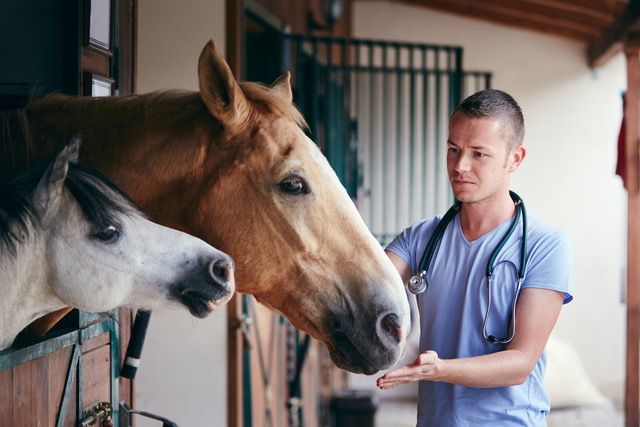Treating gastric ulcers often involves administering omeprazole, a medication that decreases acid production by the stomach. Omeprazole comes in various formulations, including pastes and granules.
A recent study found that two omeprazole formulations, one paste and one gastro-resistant granule, performed equally well for healing squamous ulcers. What came as a surprise, however, was that glandular ulcers did not heal particularly well with omeprazole. In fact, some horses without gastric lesions at the start of the study developed glandular ulcers while being treated.
“Two types of gastric ulcers affect horses: those in the squamous or upper part of the stomach and those in the glandular or lower region,” explained Catherine Whitehouse, M.S., a Kentucky Equine Research nutrition advisor.
While each type of ulcer is associated with its own risk factors, the research team of Busechian and colleagues explained that “the main cause of gastric ulcers in horses is overexposure of the stomach lining to low pH.”*
Medications like omeprazole are designed to increase the pH, thus making the stomach less acidic, and are frequently prescribed to horses with either squamous or glandular gastric disease. Unfortunately, not all horses respond to omeprazole, and one reason may be differences in the formulation of omeprazole.
The researchers recruited 30 horses with grade 2-4 squamous ulcers diagnosed endoscopically. Ulcers are scored based on severity: grade 1 denotes no lesions but a yellowing stomach lining; grade 2 indicates a small single or multiple superficial lesions; grade 3 signifies a large single or multiple superficial lesions; and grade 4 suggests extensive ulcers or deep ulceration.
Horses were then divided into four treatment groups: omeprazole paste, control paste, omeprazole granules, and control granules. The control products contained the same ingredients as the treatment groups without the omeprazole. Horses were treated for 28 days, and a follow-up endoscopic examination was performed.
Ten of those 30 horses also had concurrent glandular disease.
“Significant improvements in squamous ulcer score were found in both omeprazole treatment groups over the 28-day study period. Overall, 78.6% of squamous lesions resolved,” explained Whitehouse.
Notably, only 35.7% of the horses with glandular disease had resolution of those lesions following 28 days of treatment with omeprazole.
“In addition, some of the horses with healthy glandular mucosal regions appeared to have developed lesions even with treatment,” Whitehouse added.
Considering the inadequacy of omeprazole for equine glandular gastric disease reported in this and other studies, current recommendations suggest adding sucralfate or misoprostol to the treatment mix. In Australia, look for Sucralox.
“Another option for managing gastric ulcers in horses involves ReSolvin EQ, a blend of long-chain polyunsaturated fatty acids, including EPA, DHA, and GLA. The metabolites of these fatty acids have functional benefits to the gastric health of horses, such as reducing acid secretion, increasing bicarbonate and mucus secretion, and reducing body-wide inflammation,” Whitehouse.
Because EGGD is characterised by inflammation, oils with anti-inflammatory effects like ReSolvin EQ or EO-3 would be beneficial in the management and may speed recovery.
*Busechian, S., M.B. Conti, M. Sgorbini, G. Conte, M.C. Marchesi, C. Pieramati, F. Zappulla, V. Vitale, and F. Rueca. 2023. A comparison of the efficacy of two omeprazole formulations in the treatment of equine gastric ulcer syndrome in racehorses: a blinded, randomized clinical trial. Journal of Equine Veterinary Science. doi:10.106/j.jevs.2023.104296.











